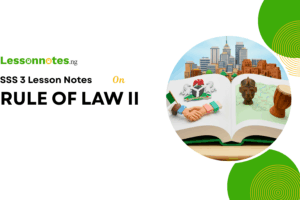Rule of Law I – Principles & Features of Rule of Law SS3 Civic Education Lesson Note
Download Lesson NoteTopic: Rule of Law I – Principles & Features of Rule of Law
SPECIFIC OBJECTIVES: At the end of the lesson, pupils should be able to
- Explain the meaning of the rule of law
- Highlight the principles of the rule of law
INSTRUCTIONAL TECHNIQUES:
- Identification,
- explanation,
- questions and answers,
- demonstration,
- videos from source
INSTRUCTIONAL MATERIALS:
- Videos,
- loudspeaker,
- textbook,
- pictures
NOTE
RULE OF LAW
Rule of Law is the absolute supremacy or predominance of the law over everybody – both rulers and the ruled and all decisions taken in a country.
According to Professor A.V. Dicey (a Briton), a professor of English law who developed and popularised the phrase “Rule of Law” in his book titled “Introduction to the Law of the Constitution” published in 1885, “those entrusted with the administration of a country should rule or exercise their authority in accordance with the established law of the land and such established law should be regarded as supreme”. The phrase has other phrases like “that no citizen can be punished except as prescribed by the law; which means that no one can be punished without trial. That the law must be known to all citizens.
The major aim of the rule of law is to ensure that the government rules according to the laws of the land.
The Main Principles and Features of the Rule of Law
- Supremacy of the law: It means that the law of a state is supreme or higher than anybody in the state. A citizen is deemed innocent until proven guilty by the law court. Anybody who is arbitrarily arrested and detained for more than twenty-four hours can apply to the law court for a writ of habeas corpus.
- Equality before the Law: It means that nobody is above the law. The law has no respect for persons irrespective of their position. In Dicey’s view, all men are equal before the laws of the land. All citizens of a country should enjoy equal access to law facilities, equal rights to fair hearings, and legal advice in the court of law. This principle assumes the notion of legality, which means due process of law in dealing with offenders.
- The Rights of the Individual: This principle states that citizens of a country should enjoy certain basic inalienable rights and liberties under the law, violation of which they have the right to seek redress in a law court which has the exclusive jurisdiction to handle such cases according to the constitution. The UN 1948 Universal Declaration of Human Rights is a good basis on which the protection of citizens’ rights is hinged.
Other Principles and Features of the Rule of Law
- Absolute supremacy or dominance of law over everybody in the land (supremacy of the law)
- Access to legal facilities.
- Provision of the constitution.
- Fair hearing.
- The law should be made public.
- Right to appeal.
- Backdating of laws.
- There should be no government censorship or influence of the press.
- Punishment must agree with the offence committed
EVALUATION:
- Explain the meaning of the rule of law
- What is the aim of the rule of law?
- Highlight the principles of the rule of law
CLASSWORK: As in evaluation
CONCLUSION: The teacher commends the students positively





















